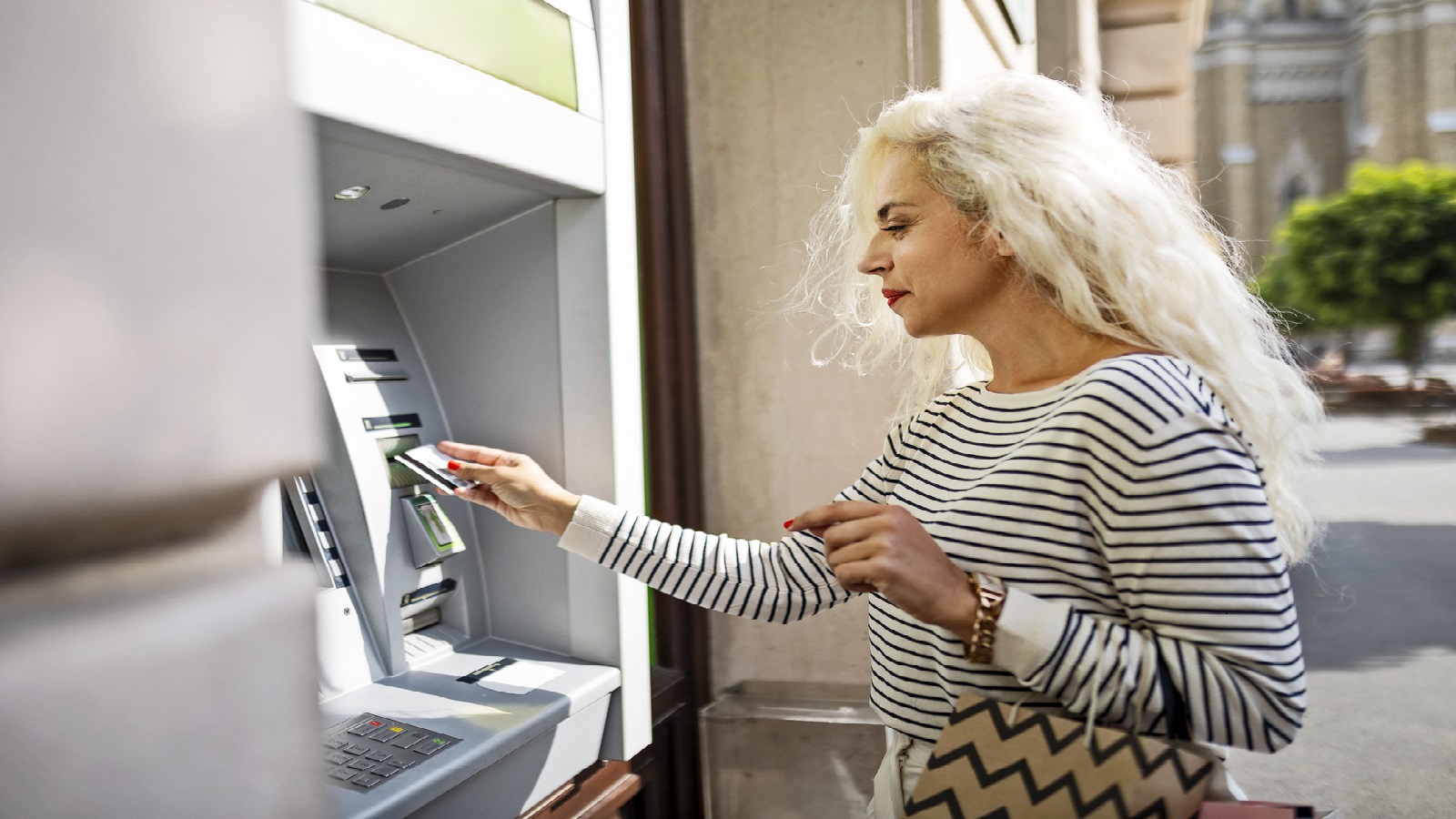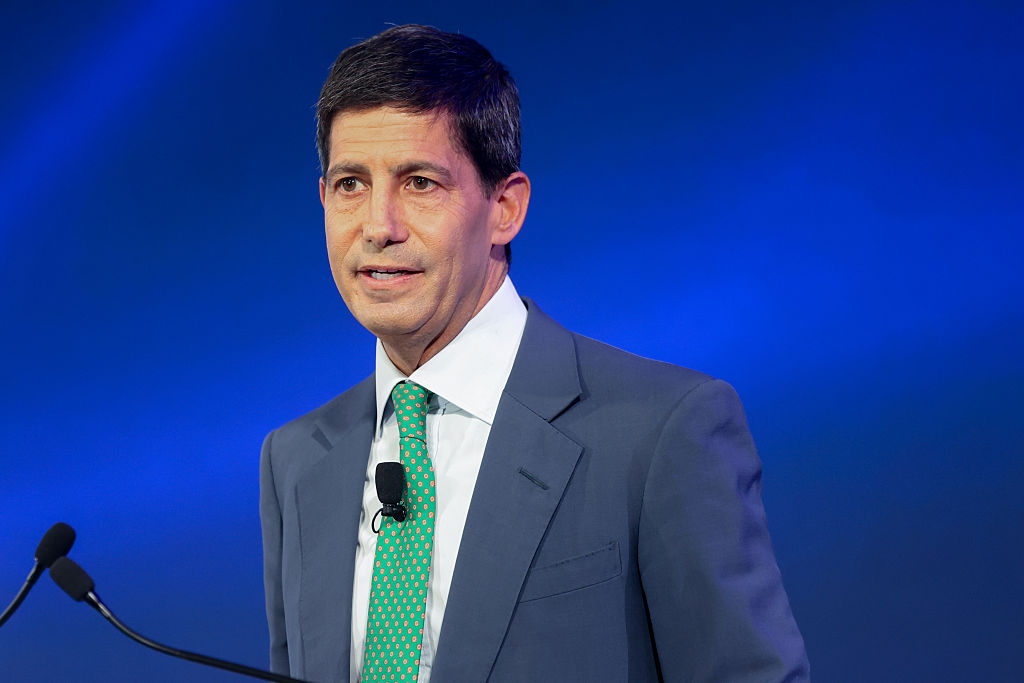ATM Fees Hit Record Highs
Cashing out your money costs more than ever, with ATM fees hitting an all-time high, according to a new survey from Bankrate.

Alexandra Twin

Profit and prosper with the best of Kiplinger's advice on investing, taxes, retirement, personal finance and much more. Delivered daily. Enter your email in the box and click Sign Me Up.
You are now subscribed
Your newsletter sign-up was successful
Want to add more newsletters?

Delivered daily
Kiplinger Today
Profit and prosper with the best of Kiplinger's advice on investing, taxes, retirement, personal finance and much more delivered daily. Smart money moves start here.

Sent five days a week
Kiplinger A Step Ahead
Get practical help to make better financial decisions in your everyday life, from spending to savings on top deals.

Delivered daily
Kiplinger Closing Bell
Get today's biggest financial and investing headlines delivered to your inbox every day the U.S. stock market is open.

Sent twice a week
Kiplinger Adviser Intel
Financial pros across the country share best practices and fresh tactics to preserve and grow your wealth.

Delivered weekly
Kiplinger Tax Tips
Trim your federal and state tax bills with practical tax-planning and tax-cutting strategies.

Sent twice a week
Kiplinger Retirement Tips
Your twice-a-week guide to planning and enjoying a financially secure and richly rewarding retirement

Sent bimonthly.
Kiplinger Adviser Angle
Insights for advisers, wealth managers and other financial professionals.

Sent twice a week
Kiplinger Investing Weekly
Your twice-a-week roundup of promising stocks, funds, companies and industries you should consider, ones you should avoid, and why.

Sent weekly for six weeks
Kiplinger Invest for Retirement
Your step-by-step six-part series on how to invest for retirement, from devising a successful strategy to exactly which investments to choose.
Using an ATM that doesn’t belong to your bank costs more than ever, but other bank fees are taking a nosedive, according to the latest research.
Your bank’s ATM isn’t always the most accessible or convenient option when grabbing cash on the go. However, out-of-network ATMs typically come with pesky fees attached to your transaction. ATM fees are comprised of two parts — a surcharge from the ATM owner and a fee from your own bank. According to a new study, those fees just got higher.
Elevated ATM fees
Consumers are paying an average of $4.73 for out-of-network ATM fees, a new record high, according to Bankrate’s 2023 study on checking accounts and ATM fees. That’s one cent more than the previous record in 2019 and seven cents more than last year. The $4.73 fee is broken down into a $1.58 bank fee and a $3.15 surcharge from the ATM owner. So you may find it more expensive to visit ATMs outside your bank’s network.
From just $107.88 $24.99 for Kiplinger Personal Finance
Become a smarter, better informed investor. Subscribe from just $107.88 $24.99, plus get up to 4 Special Issues

Sign up for Kiplinger’s Free Newsletters
Profit and prosper with the best of expert advice on investing, taxes, retirement, personal finance and more - straight to your e-mail.
Profit and prosper with the best of expert advice - straight to your e-mail.
Bankrate has tracked this information since 1998 and shows ATM fees continuing an upward trend throughout the 26-year-long study. In recent years, many banks have aided in avoiding fees by offering ATM locators, building out massive ATM networks, and even reimbursing a portion of monthly ATM fees.
Record lows in other fees
Although ATM fees are on the rise, other bank fees are nosediving. Overdraft fees are one of the largest fees your bank can charge, costing consumers as much as $38 per occurrence. Still, the average overdraft fee dipped to $26.61— down 11% since 2022 and the lowest in 19 years. Similarly, the average nonsufficient funds (NSF) fee plummeted to $19.94, a 25-year low. Despite the declines, overdraft fees and NSF fees are still charged by 91% and 70% of accounts, respectively, the study found.
As of Q4 in 2022, the Consumer Financial Protection Bureau (CFPB) reported a 48% reduction in bank revenue from overdraft and NSF fees compared to Q4 of 2019. Despite the sharp reduction in revenue, these fees still cost consumers a total of $7.7 billion last year.
Fees vary by area
ATM fees add up quickly, but there are some metropolitan areas that have higher fees than others. In a survey of 25 major metro areas, here are the five with the most expensive average ATM fees:
- Atlanta, GA, $5.33
- Phoenix, AZ, $5.24
- Detroit, MI, $5.21
- Cleveland, OH, $5.13
- San Diego, CA, $4.99
Here are the five major metro areas with the least expensive average ATM fees.
- Boston, MA, $4.24
- Philadelphia, PA, $4.31
- Seattle, WA, $4.34
- Cincinnati, OH, $4.45
- Baltimore, MD, $4.52
Checking accounts
The Bankrate study also looked at checking account fees and minimum requirements, as well as the difference between noninterest-bearing checking accounts and interest-bearing accounts.
Noninterest-bearing checking accounts are mostly free
Checking accounts that don't earn interest are still mostly free, the survey found. Roughly 45% of so-called noninterest-bearing checking accounts are free, meaning they don't charge a monthly service fee. Another 42% of noninterest accounts have no monthly fee when certain direct deposit requirements are met. In total, 87% of noninterest checking accounts are free.
Interest-bearing checking accounts have steep fees, offer little yield
Interest-bearing checking accounts typically charge more than their noninterest-bearing counterparts. The average monthly fee on such accounts is $15.33, down 5% from $16.19 in 2022, but far more than the $5.31 average monthly fee for accounts that don't bear interest.
Interest-bearing accounts often require that a customer maintains a high balance to avoid the monthly fees. The average minimum balance needed to avoid the service fee on an interest account is $8,684, Bankrate reported, versus $469 for a noninterest account.
While interest checking accounts charge a high fee and require a hefty balance, they offer little in the way of yields. The average APY on interest checking accounts inched up to 0.05% in 2023 following two years of yielding a record low of 0.03%, the study showed.
Many savings accounts offer better returns, including high-yield savings accounts. You can use our tool, in partnership with Bankrate, to get the best rate on savings accounts.
Related Content
Profit and prosper with the best of Kiplinger's advice on investing, taxes, retirement, personal finance and much more. Delivered daily. Enter your email in the box and click Sign Me Up.

Seychelle is a seasoned financial professional turned personal finance writer. She’s passionate about empowering people to make smart financial decisions by combining 10 years of finance industry experience with solid research and a wealth of knowledge. Seychelle is also a Nav-certified credit and lending expert who has explored money topics such as debt consolidation, budgeting, credit, and lending in her work for publications including GOBankingRates, LendEDU, and Credible.
- Alexandra TwinSenior Retirement Editor, Kiplinger.com
-
 Over 65? Here's What the New $6K 'Senior Deduction' Means for Medicare IRMAA Costs
Over 65? Here's What the New $6K 'Senior Deduction' Means for Medicare IRMAA CostsTax Breaks A new deduction for people over age 65 has some thinking about Medicare premiums and MAGI strategy.
-
 U.S. Congress to End Emergency Tax Bill Over $6,000 Senior Deduction and Tip, Overtime Tax Breaks in D.C.
U.S. Congress to End Emergency Tax Bill Over $6,000 Senior Deduction and Tip, Overtime Tax Breaks in D.C.Tax Law Here's how taxpayers can amend their already-filed income tax returns amid a potentially looming legal battle on Capitol Hill.
-
 5 Investing Rules You Can Steal From Millennials
5 Investing Rules You Can Steal From MillennialsMillennials are reshaping the investing landscape. See how the tech-savvy generation is approaching capital markets – and the strategies you can take from them.
-
 My Spouse and I Are Saving Money for a Down Payment on a House. Which Savings Account is the Best Way to Reach Our Goal?
My Spouse and I Are Saving Money for a Down Payment on a House. Which Savings Account is the Best Way to Reach Our Goal?Learn how timing matters when it comes to choosing the right account.
-
 How to Budget as a Couple Without Fighting About Money
How to Budget as a Couple Without Fighting About MoneyThese tips will help you get on the same page to achieve your financial goals, with minimal drama.
-
 3 Reasons to Use a 5-Year CD As You Approach Retirement
3 Reasons to Use a 5-Year CD As You Approach RetirementA five-year CD can help you reach other milestones as you approach retirement.
-
 4 Psychological Tricks to Save More in 2026
4 Psychological Tricks to Save More in 2026Psychology and money are linked. Learn how you can use this to help you save more throughout 2026.
-
 Trump Nominates Kevin Warsh to Fed Chair. How Will This Impact Savers?
Trump Nominates Kevin Warsh to Fed Chair. How Will This Impact Savers?Here's a look at how Warsh could influence future Fed policy if he's confirmed.
-
 Why Your Bank Suddenly Lowered Your APY — And What to Do Next
Why Your Bank Suddenly Lowered Your APY — And What to Do NextWhy banks lower APYs, options you can explore when it happens and whether more rate cuts are on the horizon.
-
 Do You Have a CD Maturing Soon? Here's What to Do Next
Do You Have a CD Maturing Soon? Here's What to Do NextThese strategies of what to do when you have a CD maturing soon will have you maximizing returns even with rate cuts.
-
 How to Open and Maintain an Online Savings Account Safely
How to Open and Maintain an Online Savings Account SafelyOnline banks offer generous APYs that most brick-and-mortar banks can't match. If you want to make the switch to online but have been hesitant, I'll show you how to do it safely.